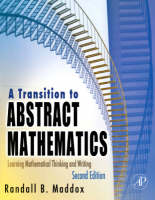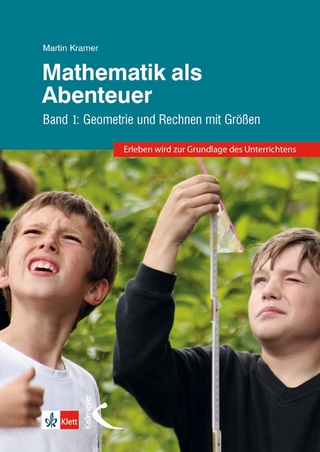
A Transition to Abstract Mathematics
Learning Mathematical Thinking and Writing
Seiten
2008
|
2nd edition
Academic Press Inc (Verlag)
978-0-12-374480-7 (ISBN)
Academic Press Inc (Verlag)
978-0-12-374480-7 (ISBN)
Teaches readers to construct proofs and communicate with the precision necessary for working with abstraction. This book covers a range of techniques used in proofs, including contrapositive, induction, and proof by contradiction. It explains identification of techniques and how they are applied in the specific problem.
Constructing concise and correct proofs is one of the most challenging aspects of learning to work with advanced mathematics. Meeting this challenge is a defining moment for those considering a career in mathematics or related fields. A Transition to Abstract Mathematics teaches readers to construct proofs and communicate with the precision necessary for working with abstraction. It is based on two premises: composing clear and accurate mathematical arguments is critical in abstract mathematics, and that this skill requires development and support. Abstraction is the destination, not the starting point.Maddox methodically builds toward a thorough understanding of the proof process, demonstrating and encouraging mathematical thinking along the way. Skillful use of analogy clarifies abstract ideas. Clearly presented methods of mathematical precision provide an understanding of the nature of mathematics and its defining structure. After mastering the art of the proof process, the reader may pursue two independent paths. The latter parts are purposefully designed to rest on the foundation of the first, and climb quickly into analysis or algebra. Maddox addresses fundamental principles in these two areas, so that readers can apply their mathematical thinking and writing skills to these new concepts. From this exposure, readers experience the beauty of the mathematical landscape and further develop their ability to work with abstract ideas.
Constructing concise and correct proofs is one of the most challenging aspects of learning to work with advanced mathematics. Meeting this challenge is a defining moment for those considering a career in mathematics or related fields. A Transition to Abstract Mathematics teaches readers to construct proofs and communicate with the precision necessary for working with abstraction. It is based on two premises: composing clear and accurate mathematical arguments is critical in abstract mathematics, and that this skill requires development and support. Abstraction is the destination, not the starting point.Maddox methodically builds toward a thorough understanding of the proof process, demonstrating and encouraging mathematical thinking along the way. Skillful use of analogy clarifies abstract ideas. Clearly presented methods of mathematical precision provide an understanding of the nature of mathematics and its defining structure. After mastering the art of the proof process, the reader may pursue two independent paths. The latter parts are purposefully designed to rest on the foundation of the first, and climb quickly into analysis or algebra. Maddox addresses fundamental principles in these two areas, so that readers can apply their mathematical thinking and writing skills to these new concepts. From this exposure, readers experience the beauty of the mathematical landscape and further develop their ability to work with abstract ideas.
By Randall Maddox, Pepperdine University, Malibu, CA, USA
Notation and AssumptionsSection I: Foundations of Logic and Proof Writing Ch 1. LogicCh 1. Language and MathematicsCh 2. Properties of Real Numbers Ch 3. Sets and Their Properties Ch 4. FunctionsSection II: Basic Principles of AnalysisCh 5. The Real NumbersCh 6. Sequences of Real Numbers Ch 7. Functions of a Real VariableSection III: Basic Principles of AlgebraCh 6. GroupsCh 7. RingsIndex
| Erscheint lt. Verlag | 13.10.2008 |
|---|---|
| Verlagsort | San Diego |
| Sprache | englisch |
| Maße | 191 x 235 mm |
| Gewicht | 970 g |
| Themenwelt | Schulbuch / Wörterbuch |
| ISBN-10 | 0-12-374480-6 / 0123744806 |
| ISBN-13 | 978-0-12-374480-7 / 9780123744807 |
| Zustand | Neuware |
| Haben Sie eine Frage zum Produkt? |
Mehr entdecken
aus dem Bereich
aus dem Bereich
Buch | Softcover (2024)
Community Editions (Verlag)
14,00 €
Geometrie und Rechnen mit Größen
Buch | Hardcover (2024)
Kallmeyer (Verlag)
29,95 €


